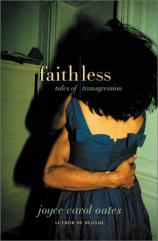Faithless: Tales of Transgression
Review
Faithless: Tales of Transgression
After putting down Joyce Carol Oates's new short story collection, FAITHLESS, I wasn't entirely sure that I liked it. To be more precise, I didn't know what to do with it. For the moral universe Oates explores in this collection is dark and tricky and full of nasty bits. And if these stories are, as indicated on the book jacket, "a startling look into contemporary America" --- well, then we all should move to Canada.
The 4 suicide attempts, 3 murders, 3 stalkings, 2 brutal sexual assaults, the stabbing and the lethal injection (this being an imperfect tally of the crimes occurring in the span of 21 stories) all startle and shock. In "Lover," for instance, a woman plans to lure her estranged lover into a fatal car accident. What comes next is one of the most bizarre car chase scenes I can ever recall reading. In fact it's so strange, so like something out of a woman-insulted-and-out-for-revenge Russ Meyer film, I wasn't sure whether to laugh or sink into unease.
As often is the case in these stories, Oates lingers over the links between violence and sexuality. Nowhere is this link more apparent than in the story "Gunlove." Here, a young woman recounts, in short, disturbing vignettes, her history with guns. In this post-Columbine, fiercely anti-gun era, it made me awfully uneasy to read over twenty pages eroticizing and fetishizing guns of various caliber and constitution. But here and in other stories that prominently feature guns ("Summer Sweat," "The Stalker," "The Vigil"), Oates doesn't glamorize weapons. In fact, I found that the lovingly detailed descriptions heightened a sense of doom and foreboding. It's clear that characters that fall out of love with humanity and into love with their weapons are pretty much doomed.
I don't want to mislead anyone --- this isn't a book so much about violence as it is about the pathology of violence and the affects of violence on innocent (or, not so innocent) witnesses. The opening story, for instance, poses an interesting moral dilemma --- what do you do when someone matter-of-factly tells you they're going to kill themselves. The answers Oates provides aren't altogether morally satisfying or complete. Nowhere in this collection does Oates provide the needy reader with a stable definition of right or wrong. Consequently, the murky, misty spaces between good and bad, real and unreal, moral and immoral become the disturbing links that bind these stories together.
"High School Sweetheart," possibly the finest story in the collection, also explores these spaces of ambiguity and uncertainty. In it, a mystery writer tells the audience an engaging but disturbing story about himself that may or may not be true. At the conclusion of the story, the audience doesn't know how to react: "...we in the audience, his friends and admirers, sat stunned, in a paralysis of shock and indecision. R__'s story had been compelling, and his delivery mesmerizing --- yet how should we applaud."
When the lines between fiction and reality blur, as they certainly do in this collection, we as readers find ourselves in an uncomfortable position. For when Oates plucks "real" figures like stalkers, scorned mistresses, and juvenile criminals, or overlooked figures like the unattractive, or the victimized from the headlines and explores their interior lives, the result is unsettling. For when the lines of sympathy and revulsion, good and bad, right and wrong blur in Oates's fiction ----- where does that leave the reader? If we can sympathize with the devil, even if only for a moment, what happens to our own sense of right and wrong?
Oates's work, so it seems, provides the reader with a lot of difficult, important, frightening questions, but it doesn't provide many answers. "Faithless" finally provokes the reader in disturbing, startling and, ultimately, satisfying ways. Between that and the crisp writing and excellent pacing, this is a collection you'll find yourself thinking about long after the final page is turned.
Reviewed by Rachel A. S. Kempste on March 6, 2001
Faithless: Tales of Transgression
- Publication Date: March 6, 2001
- Genres: Short Stories
- Hardcover: 400 pages
- Publisher: Ecco
- ISBN-10: 0060185252
- ISBN-13: 9780060185251





